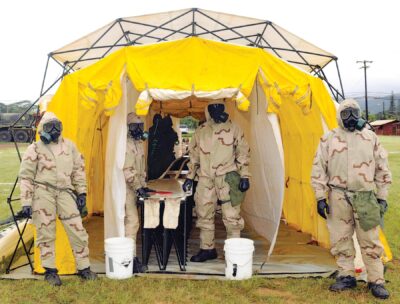 It was bound to happen: After a few US Ebola cases, there would be calls for quarantine, something we warned of in our Aug. 19 post. A nurse returning from treating Ebola patients in West Africa has been been quarantined on return to the US this Friday, although she appears to be asymptomatic and reportedly feels fine according to a phone interview on CNN.  It was also inevitable that in our litigious culture, the lawyer would be brought in very quickly to decide the issue in the courts. Ms. Hickox was released to her home in Maine after the uproar in the press, able to travel wherever she wants and free to bring the virus home to her family and the citizens of Maine. We have a different opinion and call us old-fashioned, but our view is that the public interest trumps the inconvenience of one individual who voluntarily left the country and does not want to help ensure the disease does not spread. Here’s why:
It was bound to happen: After a few US Ebola cases, there would be calls for quarantine, something we warned of in our Aug. 19 post. A nurse returning from treating Ebola patients in West Africa has been been quarantined on return to the US this Friday, although she appears to be asymptomatic and reportedly feels fine according to a phone interview on CNN.  It was also inevitable that in our litigious culture, the lawyer would be brought in very quickly to decide the issue in the courts. Ms. Hickox was released to her home in Maine after the uproar in the press, able to travel wherever she wants and free to bring the virus home to her family and the citizens of Maine. We have a different opinion and call us old-fashioned, but our view is that the public interest trumps the inconvenience of one individual who voluntarily left the country and does not want to help ensure the disease does not spread. Here’s why:
1) Eric Duncan was asymptomatic for several days after arrival and when the system finally started working in Dallas, he was admitted too late to be saved and he infected two others, both healthcare workers, one of whom traveled by air with a fever. Critics say that will not happen again; but they also said it would not happen in the first place.
2) Nurses have been very vocal about the lack of preparation in US hospitals, despite nine months of news of the oubreak.
3)Â Dr. Craig Spencer, who arrived to New York via Brussels on the 17th, Â did not exhibit symptoms until nearly a week later on the 23rd, when he was admitted to the isolation ward at Presbyterian Hospital.
4) The bungling and incompetence of the Dallas response to the Eric Duncan case, itself the source of a large impending lawsuit, demonstrates how unprepared communities were and still are, from the local hospital to the County, State and Federal Officials responsible for keeping the public safe.
5) Although undoubtedly unpopular and difficult politically, the fact is that with the long incubation period it is not possible to definitely prevent transmission of the disease without a 21-day quarantine; had one prevented Eric Duncan and Craig Spencer from entering the country,  the only us cases would be those the government purposely brought in.
6) Currently estimates in the press suggest there are over 50,000 US Entry visas from the affected countries and an incomprehensible effort is currently being made to fast track new visas.
6) Aside from the obvious Public Health risks, this is an economic time bomb; the treatment for Ebola is in the range of $1,000 per hour, and that will be borne by the taxpayer. Insurance companies are actively looking for ways to avoid coverage for Ebola, and if they do it will only increase the already unsustainable, runaway cost of care.  We wonder whether the Administration will decide to mandate care under the Affordable Care Act. The liability involved in allowing people to not undergo quarantine is a litigation minefield; with opportunities for lawsuits from Local, to State, to Federal Levels, for everyone who becomes infected here in the US.

While we do understand that individuals in our country do have rights associated with free movement, we do not think those rights transcend those of the public at large to remain safe from infection at the hands of a few who voluntarily go to countries with high infection rates and potentially bring the virus back with them.
It seems that in the case of Ms. Hickox, it was another example of an order from on high that was implemented without clear guidance or preparation. Other than physical quarantine, there are other potential methods of remote monitoring these individuals to ensure authorities are aware of potential new cases breaking out. Twenty one days of limited mobility for an individual balanced against potential outbreak in the general public leaves us without question that the Public needs consideration first.






0 Comments